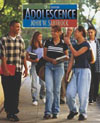John W. Santrock,
University of Texas, Dallas
| behavioral and social cognitive theories | Emphasis is placed on the importance of studying environmental experiences and observable behavior. Social cognitive theorists emphasize person/cognitive factors in development.
|
 |
 |
 |
| case study | An in-depth look at an individual.
|
 |
 |
 |
| control group | A comparison group in an experiment that is treated like the experimental group except for the manipulated factor.
|
 |
 |
 |
| correlation research | Describes the strength of the relationship between two or more events or characteristics.
|
 |
 |
 |
| cross-sectional research | Research that studies all people at one time.
|
 |
 |
 |
| dependent variable | The factor that is measured in an experiment.
|
 |
 |
 |
| eclectic theoretical orientation | Not following any one theoretical approach, but rather selecting from each theory whatever is considered the best in it.
|
 |
 |
 |
| ecological, contextual theory | Bronfenbrenner's view of development, involving five environmental systems-microsystem, exosystem, ecosystem, macrosystem, and chronosystem. These emphasize the role of social contexts in development.
|
 |
 |
 |
| Erikson's theory | Eight stages of development that unfold as we go through the life span. Each stage consists of a unique developmental task that confronts individuals with a crisis that must be faced.
|
 |
 |
 |
| experimental group | A group whose experience is manipulated in an experiment.
|
 |
 |
 |
| experimental research | Allows researchers to appropriately determine the causes of behavior.
|
 |
 |
 |
| independent variable | The manipulated, influential, experimental factor.
|
 |
 |
 |
| information-processing approach | Emphasizes that individuals manipulate information, monitor it, and strategize about it. Central to this approach are the processes of memory and thinking.
|
 |
 |
 |
| laboratory | A controlled setting from which many of the complex factors of the real world have been removed.
|
 |
 |
 |
| longitudinal research | Involves studying the same individuals over a period of time, usually several years or more.
|
 |
 |
 |
| naturalistic observation | Observation made in the "real world" outside of the laboratory.
|
 |
 |
 |
| Piaget's theory | States that individuals actively construct their understanding of the world and go through four stages of cognitive development.
|
 |
 |
 |
| psychoanalytic theory | Describes development as primarily unconscious - that is, beyond awareness - and is heavily colored by emotion.
|
 |
 |
 |
| random assignment | The assignment of participants to experimental and control groups by chance.
|
 |
 |
 |
| scientific method | An approach that can be used to discover accurate information. It includes the following steps: conceptualize the problem, collect data, draw conclusions, and revise research conclusions and theory.
|
 |
 |
 |
| standardized tests | Commercially prepared tests that assess performance in different domains. A standardized test often allows an adolescent's performance to be compared to that of other adolescents of the same age.
|
 |
 |
 |
| theory | An interrelated, coherent set of ideas that helps to explain and make predictions.
|
 |
 |
 |
| Vygotsky's theory | A socioculturally cognitive theory that emphasizes developmental analysis, the role of language, and social relations.
|



 2003 McGraw-Hill Higher Education
2003 McGraw-Hill Higher Education